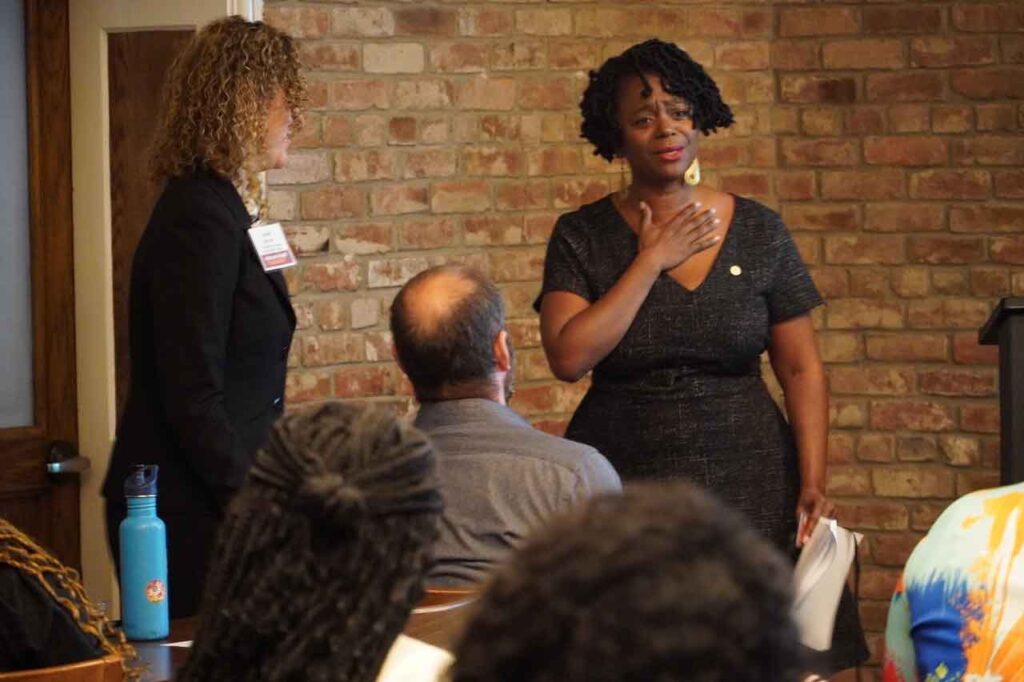At State Capitol, Advocates Employ Storytelling, Hard Numbers to Rally Support for Maternity Health Bill
To address California’s maternity health crisis, Sen. Lola Smallwood-Cuevas (D-Los Angeles) and Sen. Sabrina Cervantes (D-Riverside) authored Senate Bill (SB) 626.

By Antonio Ray Harvey | California Black Media
To address California’s maternity health crisis, Sen. Lola Smallwood-Cuevas (D-Los Angeles) and Sen. Sabrina Cervantes (D-Riverside) authored Senate Bill (SB) 626.
On April 30, the Senate Health Committee voted 11-0 to advance the legislation. It now moves to the Senate Committee on Appropriations for consideration.
Also known as “Perinatal Health Screenings and Treatment,” the legislation would require a licensed health care practitioner who provides perinatal care to screen, diagnose, and treat patients for a “maternal perinatal mental health condition,” according to the bill’s language.
“SB 626 is not just legislation — it’s a declaration that the lives of birthing people matter,” said Smallwood-Cuevas, a member of the California Legislative Black Caucus (CLBC).

Sen. Lola Smallwood-Cuevas (D–Los Angeles) spoke at the Pain to Power event hosted by the California Coalition for Perinatal Mental Health and Justice. She is the author of SB 626, a survivor-led bill aimed at strengthening California’s response to the perinatal mental health crisis. CBM photo by Antonio Ray Harvey.
“Maternal health must be treated as a human right, not a privilege. This bill moves us toward dismantling the inequities that have left too many Black, Brown, Indigenous, and marginalized families behind,” she added.
SB 626 includes key provisions such as requiring all perinatal providers to screen, diagnose, and treat maternal mental health conditions.
The bill would also require an insurance plan that covers mental health services during the perinatal period, including case management, care coordination, and at least one FDA-approved medication.
The third action of SB 626 requires health insurers and service plans to report annually on the usage and results of maternal mental health services and publicly post the data on their websites.
“As a legislator and a mom of triplets, I understand the issue both professionally and personally. That is why I am so proud to co-author SB 626,” stated Cervantes. “California has a responsibility to ensure no parent suffers in silence when help should have been within reach.”
According to information provided by Smallwood-Cuevas’ office, the United States has the highest maternal mortality rate of any developed nation, and perinatal depression – a mood disorder that emerges during pregnancy or after childbirth – is the leading cause, with only 15% receiving treatment.
In addition, the crisis disproportionately impacts Black women, people of color, low-income, and marginalized families due to obstacles in obtaining culturally competent care. The dilemma costs California $2.4 billion annually.
According to the Office of the California Surgeon General, the leading causes of death among mothers in the state are tied to heart disease (23%), hemorrhaging (14%), behavioral health (12%), and infection (12%). Perinatal mental health conditions are considered the leading complication of pregnancy and childbirth, affecting 1 in 5 mothers and 1 in 10 fathers.
On April 29, over 100 survivors, clinicians, community leaders, and advocates from across the state convened at the State Capitol for the daylong event, “From Pain to Power: A California Storytelling and Advocacy Day.”

Parents, survivors, advocates, and clinicians from across the state gathered at the State Capitol for the Pain to Power advocacy day, hosted by the California Coalition for Perinatal Mental Health and Justice. CBM photo by Antonio Ray Harvey.
The occasion featured storytelling by parents, a documentary screening, and legislative visits focused on the passage of SB 626.
The list of speakers included Jessica Walker, founder of Be Mom Aware; Gabrielle Brown, the Black Maternal and Infant Health Program Manager for Black Women for Wellness Action Project; and Cassie Gardener-Manjikian, co-founder of California Coalition for Perinatal Mental Health and Justice (CCPMHJ).
CCPMHJ is a survivor-led alliance united to reshape the perinatal mental health system through passionate storytelling, movement bonding, and policy advocacy. The founding partners include Black Women for Wellness Action Project, Maternal Mental Health NOW, PSI-California, and the Policy Center for Maternal Mental Health.
“Black mothers have long carried the heaviest burdens in a healthcare system that was never designed with us in mind,” said Brown, a maternal health advocate with CCPMHJ. “SB 626 marks a critical step toward reimagining that system — one where every parent’s mental health is prioritized, every life is valued, and every family is given the support they deserve.”
Elyse Springer, Policy and Advocacy chairperson for Postpartum Support International; Joy Burkhard, CEO for the Policy Center for Maternal Mental
Health, and documentary filmmaker and women’s health advocate Devorah Herbert participated in the discussion and explained the essence of SB 626.
“SB 626 doesn’t reinvent the wheel. It realigns the spokes to ensure new parents are seen, heard, and cared for. It’s a first step toward building the just, coordinated system our communities deserve,” said Manjikian, a public health practitioner and postpartum psychosis survivor.









